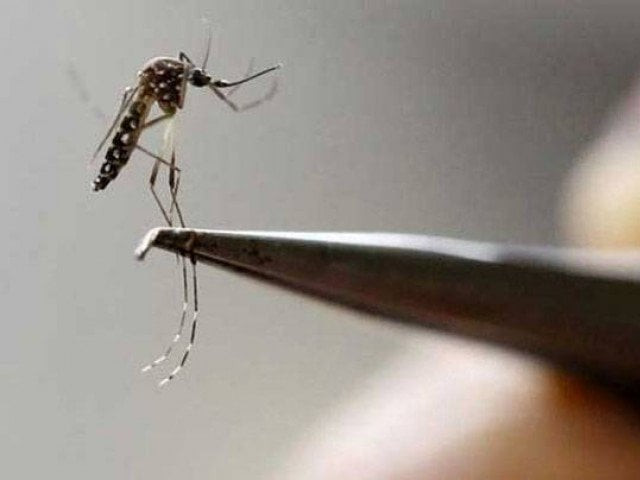Over 200 Chinese workers contracted dengue: Sindh Health Minister
Dr Azra Fazal Pechuho says the foreign nationals were unaware of prevention measures

Dr Azra Fazal Pechuho says the foreign nationals were unaware of prevention measures. PHOTO: REUTERS/fILE
“We have had 235 or so cases of dengue and all of them have been reported from the same area,” Sindh Health Minister Dr Azra Fazal Pechuho announced at a news conference on Saturday. “All the patients came from the same locality near Hawke’s Bay. They were Chinese nationals who are working on the nuclear power plant being constructed near Hawke’s Bay,” she told reporters.
According to Dr Azra, the Chinese nationals contracted dengue because they did not know what measures to take to protect themselves from the mosquito-borne virus. “We took immediate action as soon as we received news of the outbreak. Officers of the Anti-Dengue Cell acted promptly and sprayed the affected area with mosquito-killing pesticides,” she said.
“We took the Chinese workers to Agha Khan Labs for testing as soon as we diagnosed their symptoms,” saidn Sindh Dengue Control Programme Manage Dr Iqbal Memon. “We put the workers on dengue treatment immediately after confirming they were suffering from the virus.”
Both the minister and the dengue control head said the infected Chinese workers are now out of any danger. They also pointed out that health department and dengue control teams also educated the Chinese workers on measures they can take to protect themselves from dengue and to treat the virus if any of them contract it in the future.
Two die of dengue, over 600 admitted to allied hospitals
There are more than 1,000 Chinese nationals working on the nuclear plant being built near Hawke’s Bay. Although the Sindh health minister did not elaborate on what caused the outbreak, it is understood that nuclear plants require large quantities of fresh water which provide a breeding ground for dengue-carrying mosquitos. Unlike other mosquitos, those that carry the dengue virus lay their eggs on bodies of fresh water.
“Dengue-carrying mosquitos also like to breed in environments with low temperature and high humidity, conditions that are usually experienced after heavy rains or near the beach,” noted Dr Iqbal. “Water accumulated during building construction, something that is happening near Hawke’s Bay, also provides an ideal environment for dengue mosquitos to breed,” he said.
More than 1,400 people have been affected by dengue this year so far. Six of them have died of the disease in Sindh.
Karachi hospitals ill-equipped
With the threat of dengue seriously high following monsoon rains earlier this month, various health experts complained that government hospitals in Karachi still have not been provided kits to diagnose the disease. They said the absence of these kits was forcing patients to visit private hospitals, creating a heavy financial burden on those who are not well off.
Dengue Control Programme officials, however, insist that 100 hospitals across Sindh have been provided these kits.
In the aftermath of the heavy rains, Dr Iqbal said he chaired a post-monsoon review that stressed the need to create awareness about the disease. “We plan on distributing posters and pamphlets for this purpose. We will also form teams to survey government hospitals and ensure they have dengue diagnosis kits,” he told The Express Tribune some days earlier.
Both Dr Iqbal and other health experts in Karachi stressed the need for spraying pesticides across the city in the aftermath of the rains. “If we spray pesticides regularly, we can control further outbreaks,” Dr Iqbal said.
Recognising symptoms
Speaking about the symptoms of the virus, Dr Tahir Shamsi, an expert in blood diseases at the National Institute of Blood Diseases (NIBD) said that developing a high fever, pain in the bones, pain in the eyes, red spots on the body and external bleeding are some of the main signs that one has dengue.
"When afflicted with the disease, a CBC blood test has to be undertaken. However, no medicines should be taken without a doctor’s as it can worsen the situation," he warned.
According to Dr Shamsi, dengue mosquitos are active between sunset and sunrise. Individuals who are infected develop the aforementioned symptoms within five days, he said.
"Patients suffering from dengue should be given plenty of water or other liquids. To reduce the fever, administer paracetamol. However, some patients develop complications that could turn out to be fatal, so a doctor must be consulted immediately," Dr Shamsi stressed.
(With additional reporting by Rija Fatima in Karachi)



















COMMENTS
Comments are moderated and generally will be posted if they are on-topic and not abusive.
For more information, please see our Comments FAQ